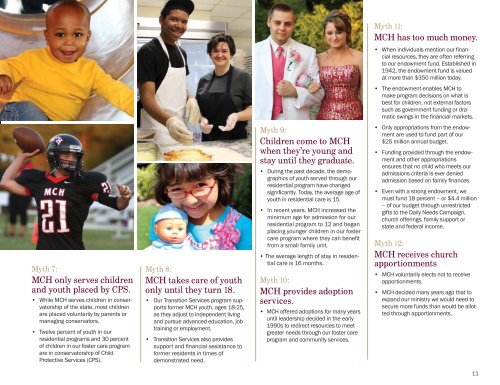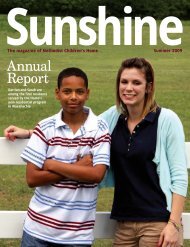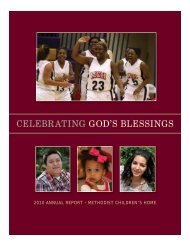Methodist Children’s Home
Annual Report final.indd - Methodist Children's Home
Annual Report final.indd - Methodist Children's Home
- No tags were found...
Create successful ePaper yourself
Turn your PDF publications into a flip-book with our unique Google optimized e-Paper software.
Myth 11:<br />
MCH has too much money.<br />
• When individuals mention our financial<br />
resources, they are often referring<br />
to our endowment fund. Established in<br />
1942, the endowment fund is valued<br />
at more than $350 million today.<br />
• The endowment enables MCH to<br />
make program decisions on what is<br />
best for children, not external factors<br />
such as government funding or dramatic<br />
swings in the financial markets.<br />
• Only appropriations from the endowment<br />
are used to fund part of our<br />
$25 million annual budget.<br />
• Funding provided through the endowment<br />
and other appropriations<br />
ensures that no child who meets our<br />
admissions criteria is ever denied<br />
admission based on family finances.<br />
• Even with a strong endowment, we<br />
must fund 18 percent – or $4.4 million<br />
– of our budget through unrestricted<br />
gifts to the Daily Needs Campaign,<br />
church offerings, family support or<br />
state and federal income.<br />
Myth 7:<br />
MCH only serves children<br />
and youth placed by CPS.<br />
• While MCH serves children in conservatorship<br />
of the state, most children<br />
are placed voluntarily by parents or<br />
managing conservators.<br />
• Twelve percent of youth in our<br />
residential programs and 30 percent<br />
of children in our foster care program<br />
are in conservatorship of Child<br />
Protective Services (CPS).<br />
Myth 8:<br />
MCH takes care of youth<br />
only until they turn 18.<br />
• Our Transition Services program supports<br />
former MCH youth, ages 18-25,<br />
as they adjust to independent living<br />
and pursue advanced education, job<br />
training or employment.<br />
• Transition Services also provides<br />
support and fi nancial assistance to<br />
former residents in times of<br />
demonstrated need.<br />
Myth 9:<br />
Children come to MCH<br />
when they’re young and<br />
stay until they graduate.<br />
• During the past decade, the demographics<br />
of youth served through our<br />
residential program have changed<br />
significantly. Today, the average age of<br />
youth in residential care is 15.<br />
• In recent years, MCH increased the<br />
minimum age for admission for our<br />
residential program to 12 and began<br />
placing younger children in our foster<br />
care program where they can benefi t<br />
from a small family unit.<br />
• The average length of stay in residential<br />
care is 16 months.<br />
Myth 10:<br />
MCH provides adoption<br />
services.<br />
• MCH offered adoptions for many years<br />
until leadership decided in the early<br />
1990s to redirect resources to meet<br />
greater needs through our foster care<br />
program and community services.<br />
Myth 12:<br />
MCH receives church<br />
apportionments<br />
• MCH voluntarily elects not to receive<br />
apportionments.<br />
• MCH decided many years ago that to<br />
expand our ministry we would need to<br />
secure more funds than would be allotted<br />
through apportionments.<br />
11
















